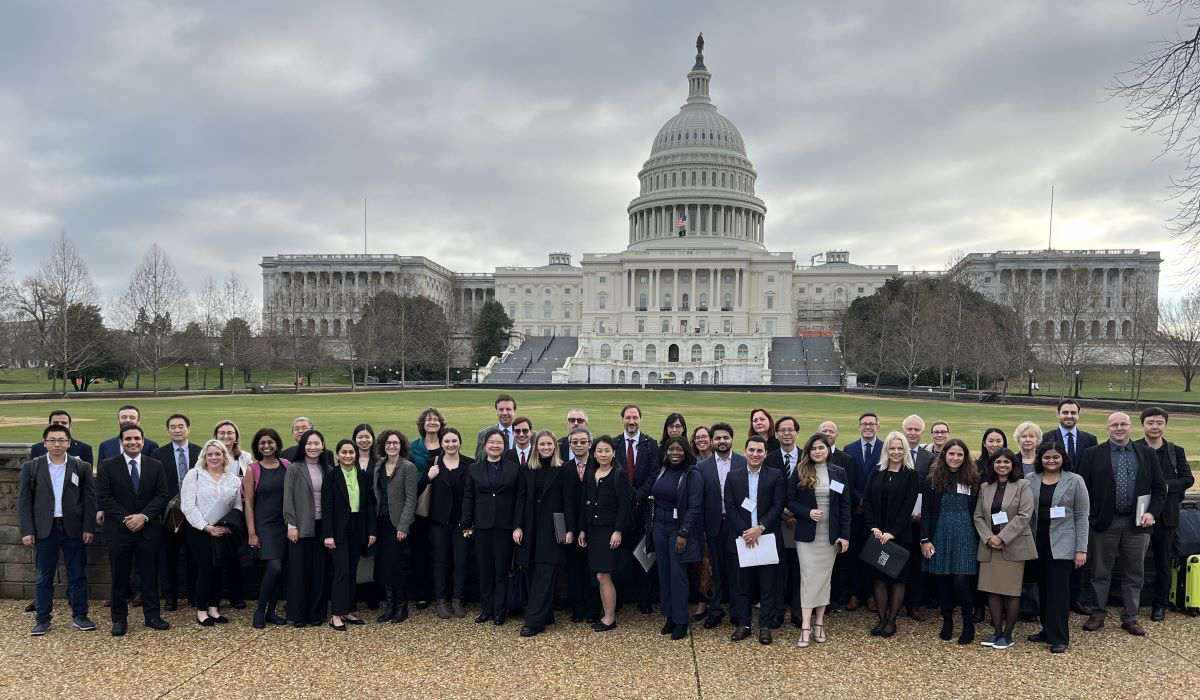 In January, two bright minds from the UAB Department of Ophthalmology and Visual Sciences took their passion for vision research to Capitol Hill. Shervonne Poleon, PhD, a postdoctoral fellow under the mentorship of Lyne Racette, PhD, and Mahmoud KhalafAllah, MD, a PhD student working with Rafael Grytz, PhD, joined Safal Khanal, OD, PhD, an associate professor in the UAB School of Optometry, to advocate for sustained federal funding for vision-related studies. Their efforts as representatives of the Association for Research in Vision and Ophthalmology (ARVO), underscored the critical importance of continued support for vision research initiatives.
In January, two bright minds from the UAB Department of Ophthalmology and Visual Sciences took their passion for vision research to Capitol Hill. Shervonne Poleon, PhD, a postdoctoral fellow under the mentorship of Lyne Racette, PhD, and Mahmoud KhalafAllah, MD, a PhD student working with Rafael Grytz, PhD, joined Safal Khanal, OD, PhD, an associate professor in the UAB School of Optometry, to advocate for sustained federal funding for vision-related studies. Their efforts as representatives of the Association for Research in Vision and Ophthalmology (ARVO), underscored the critical importance of continued support for vision research initiatives.
KhalafAllah reflected on the experience, stating, "The experience was truly fulfilling. As part of the ARVO science communication training fellowship, I had the opportunity to participate in the ARVO Advocacy Day." KhalafAllah met with Emily McBride from Senator Tommy Tuberville's office, Maggie McPherson from Senator Katie Britt's office, and Nelson Park from Representative Gary Palmer's office, to emphasize the importance of increased funding for the National Institutes of Health (NIH) and the National Eye Institute (NEI). "We emphasized the importance of ongoing vision science research at UAB, including the work being done within our laboratories as well," he added.
Poleon, during the Capitol Hill visit, engaged in discussions with senators and house representatives from New York, including Senator Kirsten Gillibrand, Senator Charles Schumer, and Representative Yvette D Clark. Poleon stressed the urgency of addressing the limited inflation-adjusted buying power of the NEI. "We had an opportunity to discuss the current research supported by the NIH/NEI, the limited inflation-adjusted buying power of the NEI, and the need for additional funding for future fiscal years," Poleon remarked.
Their advocacy efforts come at a crucial time for vision research funding. Despite a 27.6% increase in the National Eye Institute's budget over the last decade, the 29.5% biomedical inflation rate during the same period has resulted in a net change of negative 1.9% after adjusting for inflation. This indicates a decline in the NEI's purchasing power for investing in vision research. With the anticipated growth of major eye diseases and an aging population, prioritizing investment in vision research is paramount.
Vision researchers are pioneering advancements in gene therapies, imaging technologies, artificial intelligence, big data, and regenerative medicine. "It's essential to support these researchers in their quest to preserve sight and restore vision," emphasized KhalafAllah.
The advocacy efforts of Poleon, KhalafAllah, and their colleagues are pivotal in ensuring that vision research receives the attention and resources it deserves. Their dedication to advancing scientific knowledge and improving eye health serves as a beacon of hope for millions worldwide. Through continued collaboration and advocacy, we can pave the way for groundbreaking discoveries that will transform the landscape of vision care for generations to come.